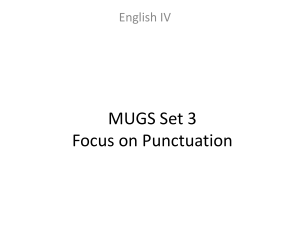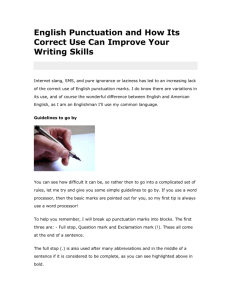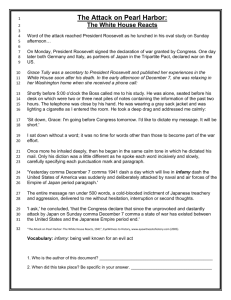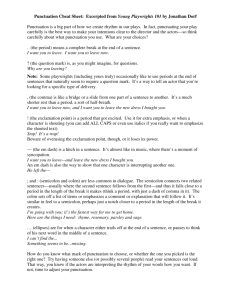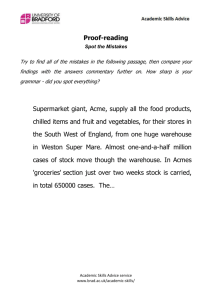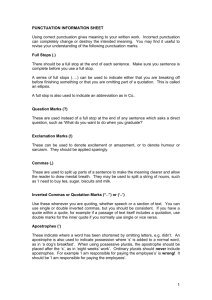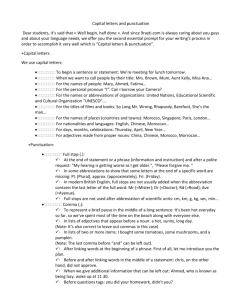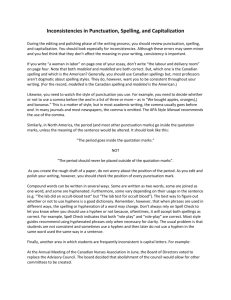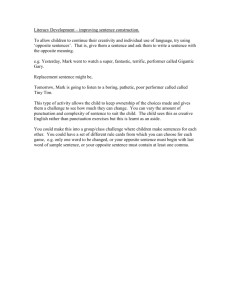Sharpening Your Writing Skills
advertisement
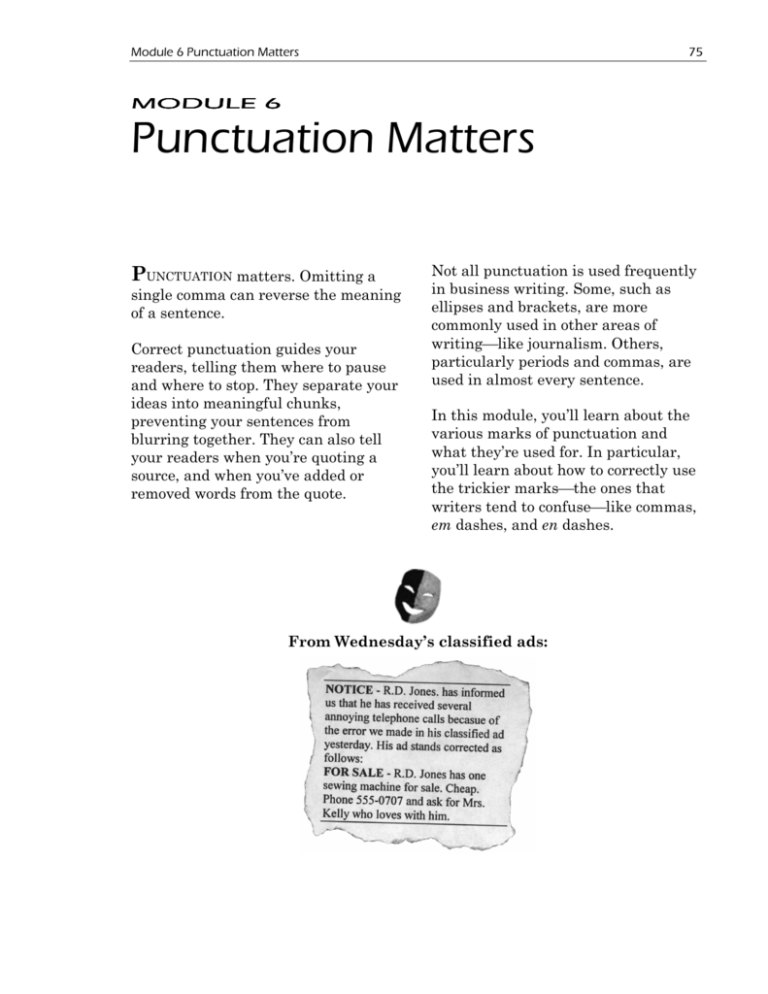
Module 6 Punctuation Matters 75 MODULE 6 Punctuation Matters PUNCTUATION matters. Omitting a single comma can reverse the meaning of a sentence. Correct punctuation guides your readers, telling them where to pause and where to stop. They separate your ideas into meaningful chunks, preventing your sentences from blurring together. They can also tell your readers when you’re quoting a source, and when you’ve added or removed words from the quote. Not all punctuation is used frequently in business writing. Some, such as ellipses and brackets, are more commonly used in other areas of writinglike journalism. Others, particularly periods and commas, are used in almost every sentence. In this module, you’ll learn about the various marks of punctuation and what they’re used for. In particular, you’ll learn about how to correctly use the trickier marksthe ones that writers tend to confuselike commas, em dashes, and en dashes. From Wednesday’s classified ads: 76 Sharpening Your Writing Skills Common marks of punctuation Mark Name Use to… . period End a sentence or indicate an abbreviation , comma Separate list items, link complete thoughts, enclose parenthetic thoughts, or separate introductory phrases ; semicolon Separate two independent clauses not joined by a conjunction. Often thought of as a soft period : colon Introduce a list “” double quotes Indicate a quotation from a person or publication ‘’ single quotes Indicate slang or a quotation within a quotation () parentheses Set off remarks that explain or comment on the sentence [] brackets Indicate your own words within a quotation … ellipsis Indicate words that have been deleted from a quotation — em dash Enclose or set off parenthetic expressions or abrupt changes in thought – en dash Indicate continuing or inclusive numbers, such as dates, times, or reference numbers - hyphen Create hyphenated words, such as “co-worker,” or to create compound modifiers, such as “one-day course” ? question mark Indicate a question ! exclamation mark Emphasize a statement—infrequently used in business writing & ampersand Replace “and”—spell out instead / slash Indicate an and/or situation (avoid by stating whether one or both possibilities exist) Module 6 Punctuation Matters 77 Commas (,) Commas are the trickiest of the marks of punctuation, but one of the most important to use correctly. Here are six places to use commas. 1. To separate three or more items in a list. Place a comma between each item. For business and technical writing, place a comma after the second-to-last item (this comma is commonly referred to as the serial comma). In other types of writing, the serial comma is often not used. In some writing situations, particularly with compound list items, using the serial comma prevents possible confusion. Example …computer, monitor, and keyboard. 2. To separate two independent clauses (complete sentences) joined by a conjunction (such as “and,” “but,” “for,” “or,” “nor,” “yet,” “still”). Example The financial records of the company went up in smoke, and the general ledger cannot be reconstructed. Don’t use a comma if the two independent clauses are short and closely related. Example The company changed its policy and the number of complaints dropped immediately. Don’t use a comma before a clause that cannot stand on its own as a complete sentence. Example The president said that a public meeting would have to be held before the department would consider changing its policy. 3. To set off introductory phrases or conditions. If the interruption to the flow of the sentence is slight, you can omit the comma. Examples Walking slowly up the hallway, he saw the crowd gathered around the coffee machine. If the float is out by less than $10, ignore the difference. In 2000 we decided not to file an income tax return. (Comma omitted because interruption is slight) 78 4. Sharpening Your Writing Skills To enclose parenthetic phrases and clauses. Parenthetic remarks are explanations or afterthoughts that are inserted into sentences that are grammatically complete without the insertion. Never use a single commaalways use two. Examples The taxes, which are unreasonable, will not be paid. noun separately and are called cumulative adjectives. Don’t use a comma to separate an adjective from the noun that follows it. Example She is a strong, confident, independent woman. (Coordinate adjectives, which can be joined by “and” and can be jumbled) The tax audit started on April 20, 2001, and will be finished within one year. Four small red shapes emerged from the fog. (Cumulative adjectives, which can’t be joined by “and” and can’t be jumbled) 5. 6. To separate consecutive adjectives that can be joined by “and” and whose order can be jumbled. These adjectives each modify the noun separately and are called coordinate adjectives. Don’t use a comma to separate adjectives that can’t be joined by “and” and whose order can’t be jumbled. These adjectives do not modify the To separate adverbs such as “accordingly,” “further,” “however,” “thereafter,” “indeed,” “instead,” “next,” “similarly,” and “finally” from the text that follows. Example However, some revisions may be needed. Module 6 Punctuation Matters 79 Colons and semicolons (: ;) Use colons to introduce lists of items, whether in paragraph or bullet-list form. Example Bring the following items: pen, pencil, ruler, and eraser. Bring the following items: • • • • pen pencil ruler eraser Use semicolons to separate two independent clauses not joined by a conjunction (such as “and” or “but”). Think of semicolons as light periods. In most business and technical writing, you can use two sentences instead. Examples It is nearly 4:30 p.m.; we cannot meet the deadline. Work hard when you work; play hard when you play. From Thursday’s classified ads: 80 Sharpening Your Writing Skills Punctuating lists There are three options for punctuating lists. Option 1 – If the introductory phrase and the listed items are meant to be read as one complete sentence, then use the same punctuation and capitalization you would use in a paragraph. Example: Option 1 Punctuate lists by: • placing a comma (or possibly a semicolon) after each item, • placing a comma after the secondto-last item (the serial comma), and • concluding with a period. Option 2 – When the listed items are single words or phrases and do not form complete sentences, then drop all punctuation. Some writers like to capitalize each item, while others do not. This is the simplest and most popular option. Example: Option 2 Bring the following items to class: • • • pens pencils books Option 3 – When the listed items form complete, independent sentences, then capitalize each sentence and place a period at the end. Example Follow these rules for punctuating list items that are complete sentences: • Make sure all items are complete sentences. • Capitalize the first word of each sentence. • Place a period at the end of each sentence. Tips for creating lists: • use lists for three or more items (no fewer) • introduce each list with a sentence or phrase • single-space lists of words or short phrases, and double-space lists of long phrases or sentences • use bullets for lists, and numbers for steps • structure all items in a list similarly (see Write in parallel ways, page 56) Module 6 Punctuation Matters 81 Apostrophes (’) Use an apostrophe to indicate a contraction or to form the possessive. Contractions The apostrophe replaces the omitted letters (see Use contractions, page 68). Examples of contractions: • • • • he’s she’s doesn’t it’s Singular possessive Add “s” to any word to form the singular possessiveeven singular words that end in “s.” It’s acceptable to use only an apostrophe if adding “s” makes the pronunciation awkward. Example Bob’s dilemma is Lewis’s opportunity. Sophocles’ books are hard to understand. (Acceptable because “Sophocles’s” would be awkward to pronounce) The possessive form of “it” is “its” (no apostrophe). Plural possessive Add the apostrophe after the “s.” If the word is plural but doesn’t end in “s,” add “’s.” Example Taxpayers’ rights Children’s rights 82 Sharpening Your Writing Skills Parentheses ( ) Parentheses set off remarks that explain or comment on the sentence, but are not directly related to the theme of the sentence. The following example from the Manual of the American Psychological Association shows the rules for punctuation and parentheses. Parenthetic remarks are disruptive to the reader, so avoid using them in business writing. If the remark is important, integrate it into the sentence, or create a new sentence. If not, omit it. Example It’s okay to use parentheses for spelling out acronyms and where the parenthetic remark is short. Example Students must return all materials (these include sample manuals and textbooks) to the instructor. (Disruptive avoid) Students must return all materials, such as sample manuals and textbooks, to the instructor. (Preferred) If the parenthetical item falls in the middle of the sentence (such as this), the comma follows the parenthesis. (If a complete sentence, like this one, is enclosed in parentheses, the period is placed inside the final parenthesis.) The period follows the parenthesis that falls at the end of a sentence (like this). Module 6 Punctuation Matters 83 Quotation marks (“ ”) Use quotation marks to indicate that you’re quoting exact words from a person or publication. If the quotation has a quotation within it, use single quotes for the inner quote. In Britain, this convention is reversedsingle quotes go on the outside, and double quotes, if necessary, go on the inside. Use curly quotes (“ ”), sometimes called smart quotes, rather than straight quotes (" "). Most word processors have a smart quotes feature you can turn on. Place lengthy quotations consisting of a paragraph or more in a separate indented paragraph. Commas and periods go inside the closing quote. Colons and semicolons go outside. Example The dictionary defines harassment as “any conduct, comment, gesture, or contact that causes offence, intimidates, or humiliates another.” He said, “I prefer typewriters to computers”; this surprised us. Where exclamation marks and question marks go depends on whether they are part of the quotation or part of the whole sentence. Example My youngest daughter asked, “When does the question mark go outside the quotation mark?” Have you heard the old saying “If it ain’t broke, don’t fix it”? Also use quotation marks to refer to an article in a publication. Example Refer to the article “Writing Ability Critical to Career Success” in the National Post. 84 Sharpening Your Writing Skills Hyphens (-) Use hyphens sparingly. Don’t use hyphens to equalize line lengths. A ragged-right margin is easier to read than an even one. In general, only use hyphens to avoid ambiguity or awkward pronunciation. Here are some examples of when to use a hyphen: • with certain prefixes and suffixes (for example, “re-evaluate,” “co-worker”) • with the prefixes “all-,” “ex-,” “non-,” and “self-” • after a series of words with a common base that is not repeated (for example, “short- and long-range planning”) • to create compound terms that precede the words they modify (for example, “well-designed plans,” “up-to-date safety requirements,” “one-day course”) • if the words in the compound term follow the words they modify, do not use a hyphen (for example, “the plans were well designed”) • to combine fractions and compound numbers from 21 to 99 (for example, “two-thirds,” “one-quarter,” “forty-nine”) • to combine numeral-unit adjectives (for example, “10-metre pipe”) • to combine an initial capital letter with a word (for example, “U-turn”) When using compound terms in headings, capitalize the word after the hyphen if it’s a noun or proper adjective or if the words have equal weight. Do not capitalize a second word that modifies the first word (for example, “Follow-up Procedure”). Module 6 Punctuation Matters 85 Em dashes (—) and en dashes (–) Em dash (—) En Dash (–) Use an em dash to enclose or set off parenthetic expressions—or abrupt changes in thought—when commas and parentheses aren’t strong enough. Use an en dash to indicate continuing or inclusive numbers, such as dates, times, or reference numbers. Don’t put spaces on either side of an en dash. Use an em dash to expand on a phrase in the main clause of the sentence, or where a sentence is introduced by a list. Or use it to set off concluding remarks—for emphasis. But don’t overuse em dashes—they become annoying after awhile. Like the em dash, the en dash is not on your keyboard. It’s a special character that you must insert into your document. Don’t put spaces on either side of an em dash. The em dash is not on your keyboard— it’s a special character that you must insert into your document. Examples To further develop these ideas—this may be our last chance—we decided to meet at the beginning of next month. Article 111.2, article 111.3, and article 119—all will influence this decision. Use small caps for acronyms—for example, GVRD. Examples June–July 1922 10:00 a.m.–5:00 p.m. pages 19–24 Keyword headings – Also use an en dash in keyword headings (like here), to set the keywords apart from the text. When using it in this context, put spaces on either side. 86 Sharpening Your Writing Skills Other marks of punctuation Exclamation marks (!) Brackets [ ] You hardly ever need to use exclamation marks in business writing, except perhaps in personal correspondence to friends. Not even in copy writing! Use brackets to indicate that you have substituted your own words in a quotation to suit your context. Example Our firm has many years of experience! (Shouting) Our firm has many years of experience. (Better) Ellipsis (…) Use an ellipsis (three spaced periods) to indicate an omission from a quotation. The ellipsis is not on your keyboard—it’s a special character that you must insert into your document. If you insert three periods in a row, your word processor will insert the correct character automatically. Example She instructed, “When you omit words in quoted material, use a series of three spaced periods, called an ellipsis, to indicate the omission.” She instructed, “When you omit words in quoted material, use a series of three spaced periods…to indicate the omission.” Example Our investigation indicates that Bob Smith Contracting was negligent. Our investigation indicates that [the contractor] was negligent. Slash (/) Don’t use a slash to indicate an “either/or” choice (for example, “he/she,” “employees/contractors”) or to replace “and” (for example, “close/lock the door”). Use either “and” or “or,” whichever is appropriate. Use a slash to express a combination— for example, “employer/employee relationship,” “on/off switch.” Module 6 Punctuation Matters 87 Exercise 27: Punctuate the following As an experiment take any randomly selected paragraph and copy it making no changes other than removing all punctuation marks you probably will find it confusing with sentences and thoughts running together without any indication of where to stop and pause the absence of punctuation marks leaves you with no clue for your inflections and without inflections the string of words is meaningless you must separate words group them before they make sense to bring order out of chaos is to separate separating is the first step toward understanding and the first function of punctuation marks is to serve as separators Exercise 28: Punctuate this Try to punctuate the following line of words—when punctuated correctly, it makes perfect sense: That that is is that that is not is not is that it it is 88 Sharpening Your Writing Skills Why English is hard to learn Some reasons why English is hard to learn: • The insurance was invalid for the invalid. • The bandage was wound around the wound. • There was a row among the oarsmen about how to row. • The farm was used to produce produce. • They were too close to the door to close it. • The dump was so full it had to refuse more refuse. • The buck does funny things when the does are present. • We must polish the Polish furniture. • • He could lead if he would get the lead out. A seamstress and a sewer fell down into a sewer. • • The soldier decided to desert his dessert in the desert. The wind was too strong to wind the sail. • • Since there is no time like the present, he thought it was time to present the present. After a number of injections my jaw got number. • Upon seeing the tear in the painting I shed a tear. • A bass and a bass were painted on the base of the bass drum. • I had to subject the subject to a series of tests. • When shot at, the dove dove into the bushes. • How can I intimate this to my most intimate friend?
